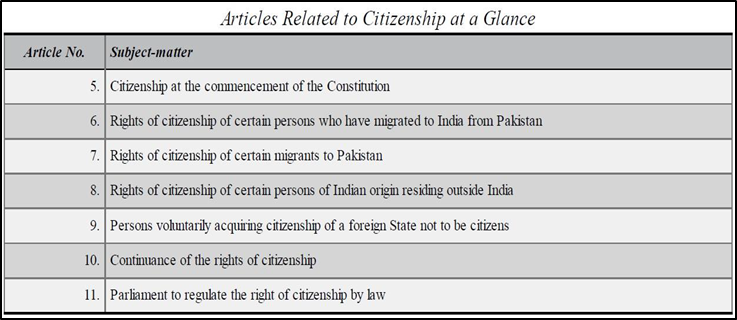In News:
- According to data presented by the Ministry of Home Affairs in the Lok Sabha, over 1.6 lakh Indians renounced their citizenship in 2021 (for personal reasons).
- This is the highest number in the previous five years.
- Over 78,000 Indians acquired U.S. citizenship followed by Australian, Canada, U.K. etc.
What’s in today’s article:
- Citizenship in India – Meaning, Constitutional provisions, Persons deemed to be citizens of India on Jan 26, 1950, The Citizenship Act, 1955
- The Citizenship (Amendment) Act (CAA), 2019
Citizenship in India:
What is citizenship?
- A state's population is divided into two categories - citizens and non-citizens. A state's citizens have full civil and political rights, while a non-citizen has no such rights.
- For example, under the Indian constitution, certain fundamental rights are available only to the citizens, namely - Article 15, Article 16, Article 19, Article 29 and 30.
- Also, the right to vote and become members of the union and state legislatures are exclusive to Indian citizens.
Constitutional provisions relating to citizenship in India:

- The Indian Constitution establishes only a single citizenship, namely Indian citizenship.
- This means there is no separate state citizenship (USA, Switzerland, etc., on the other hand, adopted the system of double citizenship).
- The Indian constitution (Part II - Article 5-11) doesn’t prescribe a permanent provision relating to citizenship in India.
- It simply describes categories of persons who are deemed to be citizens of India on the day the Indian constitution was commenced (Jan 26, 1950).
- It leaves citizenship to be regulated by law made by the Parliament of India (Article 11).
Persons deemed to be citizens of India on Jan 26, 1950:
- There are four categories of such persons -
- Citizenship by domicile (Article 5): A person who was born in India or either of the person’s parents was born in India, etc.
- Citizenship of migrants to India from Pakistan (Article 6).
- Citizenship of migrants of Pakistan (Article 7).
- Citizenship of persons of Indian origin residing outside India (Article 8).
The Citizenship Act, 1955:
- About the Act:
- A comprehensive law dealing with citizens was passed by Parliament of India in accordance with the powers vested in it by Article 11 of the Constitution.
- The provisions of the Act may be broadly divided into three parts, acquisition of citizenship, termination of citizenship and supplemental provisions.
- Acquisition of Citizenship: The Act provides five modes of acquiring the citizenship of India. These are -
- By Birth: Every person born in India on or after January 26, 1950 but before June 30, 1987, shall be a citizen of India by birth.
- By Descent: A person born outside India on or after January 26, 1950, shall be citizen of India by descent if his father or mother is a citizen of India at the time of his birth.
- By Registration: Any person who is not already an Indian citizen by virtue of the provisions of the Constitution or those of this Act can acquire citizenship by registration.
- By Naturalisation: Any person who does not come under any of the categories mentioned above can acquire Indian citizenship by naturalisation if his application for the same has been accepted by the Government of India and certificate is granted to him to that effect.
- By Incorporation of Territory: If any territory becomes part of India, the Government of India, may specify the persons who shall be citizens of India by reason of their connection with that territory.
- Termination of Citizenship: The Act envisages three situations under which a citizen of India may lose his Indian nationality. These are -
- By Renunciation: If any citizen of India who is also a national of another country renounces his Indian citizenship through a declaration in the prescribed manner, s/he ceases to be an Indian citizen of registration of such declaration.
- By Termination: If any person who acquired Indian citizenship by naturalisation, registration or otherwise, or s/he voluntarily acquired the citizenship of another country at any time between January 26, 1950 and December 30, 1955, the date of commencement of this Act.
- By Deprivation: The Central Government is empowered to deprive a citizen of his/her citizenship under the act. But, this power of the Government may not be used in the case of every citizen, it applies only to those who acquired Indian citizenship by naturalisation, etc.
The Citizenship (Amendment) Act (CAA), 2019:
- About:
- The Act seeks to amend the definition of illegal immigrant for Hindu, Sikh, Parsi, Buddhist and Christian immigrants from Pakistan, Afghanistan and Bangladesh, who have lived in India without documentation.
- They will be granted fast track Indian citizenship in 5 years (11 years earlier).
- It also provides for cancellation of Overseas Citizen of India (OCI) registration where the OCI card-holder has violated any provision of the Citizenship Act or any other law in force.
- Who is eligible?
- The CAA, 2019 applies to those (Hindu, Sikh, Parsi, Buddhist and Christian immigrants) who were forced or compelled to seek shelter in India due to persecution on the ground of religion. It aims to protect such people from proceedings of illegal migration.
- The cut-off date for citizenship is December 31, 2014 which means the applicant should have entered India on or before that date.
- The act will not apply to areas covered by the Constitution's sixth schedule, which deals with autonomous tribal-dominated regions in Assam, Meghalaya, Tripura, and Mizoram.
- Additionally, the act will not apply to states that have an inner-line permit regime (Arunachal Pradesh, Nagaland and Mizoram).









